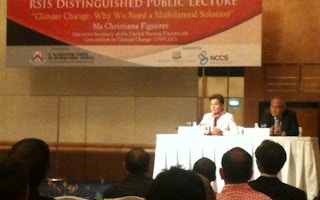Multilateral climate negotiations are “cumbersome but absolutely crucial” to responding to global warming, said the United Nations climate chief in Singapore on Thursday.
UN Framework Convention on Climate Change (UNFCCC) executive secretary Christiana Figueres said at a lecture hosted by the Rajaratnam School of International Studies that the world faced a big gap between commitments to reduce greenhouse gas emissions and the reductions that scientists say will be needed to minimize catastrophic effects.
“I have no doubt that the clean energy revolution is underway, and the tipping point (toward a low-carbon economy) is inevitable. But I am concerned about the timing and the speed,” she added.
Current commitments from governments to reduce greenhouse gas emissions account for only 60 per cent of the amount to keep global warming within the commonly accepted target window of 2 degree Celsius.
To reach that target will take a combination of international government efforts and simultaneous action on national and regional levels from all sectors, said Ms Figueres to the 200-strong group of policymakers, academics and other professionals at the Shangri-La Hotel.
The global climate negotiation process has helped spawn an “endless number of efforts on the ground pioneered by an increasing number of sectors and stakeholder”, and has added climate change to the very short list of issues to which a truly universal response will be made, she added.
For example, she noted that in 2013, carbon prices in 33 countries and 18 sub-national regions will regulate 20 per cent of global emissions.
Ms Figueres said that governments were making progress on closing the three gaps that were identified at last year’s talks in Durban, South Africa, and that would help provide the policy certainty necessary to drive private sector action and investment.
The first gap is the time between the expiration of the only existing legally binding agreement on carbon emissions - the Kyoto Protocol - at the end of this year, and a new global agreement slated for adoption in 2015 and implementation in 2020.
In an unusual step for the negotiations, she said, governments have managed to come up with a preliminary draft text for a second period of the Kyoto Protocol – called the Doha Amendment – which will be used at the upcoming talks in Doha, Qatar.
Ms Figueres told Eco-Business in an interview after the lecture that –while the countries that commit to the second period of the Kyoto Protocol initially will account for only 10 to 12 per cent of global greenhouse emissions - the agreement would be an important reference point for work taking place on the new global agreement through 2015.
“In and of itself, it is limited in what it can do with respect to the trajectory of global emissions. It is, however, very important in terms of its rules and maintaining the environmental integrity of the process,” she said.
The second gap is the gap in financing to help developing countries cope with climate change. In 2009, wealthy countries committed to provide ‘fast-start’ funding in the form of US$30 billion annually by 2012. The following year in Cancun, negotiators agreed to establish a $100 billion Green Climate Fund by 2020, and have since been struggling with how to implement the fund.
However, the climate fund committee is making progress, noted Ms Figueres. “We have much better traction to launch the Green Climate Fund” and are working on resolving differing viewpoints and defining funding mechanisms, she added.
The committee in charge of the fund is currently meeting in South Korea, and is expected to announce which country will host the new fund on Sunday.
Negotiations for the 2020 global agreement, known as the Durban Platform, aim to close the third gap – the lack of sufficiently ambitious emissions reduction targets and the need for more countries to commit to making the required reductions.
In that too, governments are making progress after having received input from governments, NGOs, businesses and other groups, noted Ms Figueres.
“We have some preliminary ideas…and first thoughts on how to deal with the very, very different national circumstances of countries in shaping an effective, fair and ambitious agreement that would be applicable to all,” she said.
Climate talks involving every country and many negotiators – while frustrating – were essential to achieving a plan that was cost effective and durable, said Ms Figueres, adding that climate change was a universal problem to which every country could contribute in some way.
The expanding numbers of ministries and sectors adding input to the process has also increased the complexity of the talks, she noted, explaining that climate change was no longer a small environmental issue involving only environment ministers.
“This is a development challenge the likes of which the world has never seen,” she said.
Yet, while climate change could wipe out decades of development progress and threatens future sustainability, the challenge also pushes people towards improved ways of living and doing business that are in their own best interests, she noted.
“There is barely any measure you can take to address climate change that does not make sense to our development,” she told the audience.

















